Master in Religions and Business
Professional Master in Religions and International Business (Hinduism, Islam, Jainism, Buddhism)
The objective of the Master in Religions and International Business (Online, 60 ECTS) taught by EENI Business School is to provide the student with all the necessary knowledge to analyze the influence of the different religions of the world (Christianity, Islam, Hinduism...) on International Business and global economic areas (Western, Buddhist, Hindu, Islamic, Orthodox, Sinic...).

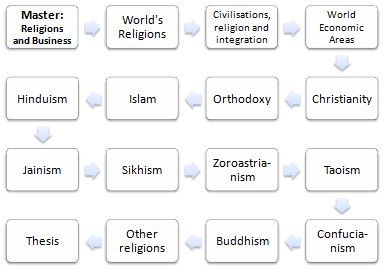
 Enrol / Request for Information
Enrol / Request for Information

- Credits of the Master: 60

- Duration: 1-year It is recommended to dedicate about twelve hours of study per week following a flexible schedule. It is possible to reduce the duration dedicating more hours a week
- Tuition Fees: € 1,000
- Open Online Enrollment
- Download the Admission Form
- Frequently Asked Questions (FAQ)
- Download the syllabus (PDF) of the Master
Language of the Master: 
- Also available in For improving the international communication skills, the student has free access to the learning materials in these languages (free multilingual training). The student can review the subjects in whatever language and use one of the four languages as a vehicular language of the campus and to complete the exercises. The student can do the exercises, thesis or communicate with professors in English, French, Spanish or Portuguese.
 Master en religions et affaires
Master en religions et affaires  Máster en Religiones y Negocios
Máster en Religiones y Negocios  Mestrado em Religiões e Negócios
Mestrado em Religiões e Negócios
To successfully complete this Master's Degree it is advisable to have a previous knowledge of foreign trade and / or international economic relations.
The graduate students in this Master can Enroll directly in the Doctorate in Global Ethics, Religions, and International Business. Moreover, they only need to complete the research methodology module, Thesis, and other modules are not studied in this Master.
The following modules compose the Professional Master in Religions and International Business:
Introduction to the Religions of the World.
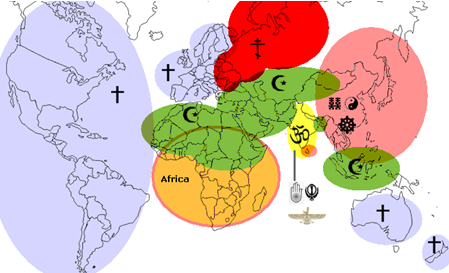
Christianity and Business (21 ECTS) (PDF) (structure)

- Catholicism (structure)
- Protestantism (structure)
- The role of Agnosticism and Judaism in the economic areas of the Western Civilization
- Economic Areas of the Western Civilization
- European Economic Area (PDF)
- American Economic Area
- Economic Area of Oceania (PDF)
- African Economic Area (The African Traditional Religions, Christianity and Islam are the main religions)
- Why study “Christianity and Business”?
Orthodoxy and Business (3 ECTS) (PDF) (structure)
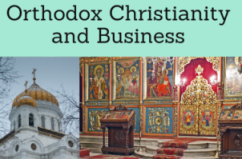
Islam and Business (15 ECTS) (PDF) (structure)

- Sunnis and Shiites
- Islamic Institutions (PDF) and the Arab Funds for Development (PDF)
- Islamic Economic Area
- Why study “Islam and Business”?
Indian Religions
and Business (6 ECTS) (PDF)
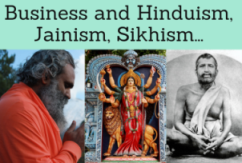
- Hinduism (structure)
- Jainism (structure)
- Zoroastrianism (structure)
- Sikhism (structure)
- Hindu Economic Area (PDF)
- Why study “Indian Religions and Business”?
Chinese Religions and Business (5 ECTS) (PDF)
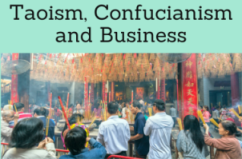
- Confucianism (structure)
- Taoism (structure)
- Sinic Economic Area
- Why study “Taoism, Confucianism and Business”?
Buddhism and Business (5 ECTS) (PDF) (structure)
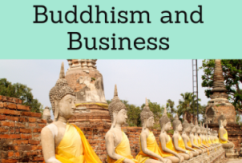
Other religions: Baha'i Faith and the Traditional African Religions
Master's Thesis (5 ECTS).
ECTS = European Credit Transfer and Accumulation System
PDF= download the index and objectives of the subject in PDF format

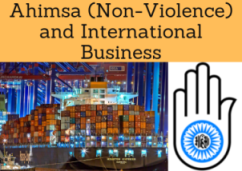
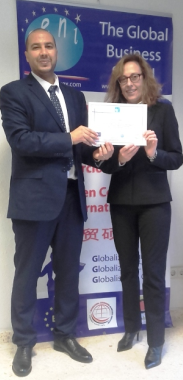
The student has to pass the online continuous assessment exercises for each subject as well as the final online Master's Thesis. If the professor considers that the minimum level has not been reached, he will guide the student to improve the quality of his exercises or thesis and send them back.
The most important thing for EENI is that the student correctly learns the Master's subjects and objectives.
Once all the exercises and thesis have been approved, the student obtains the “Diploma of Professional Master in Religions and International Business” issued by EENI Global Business School.
In this case, it will be necessary to send us by mail (not valid by email) a certified photocopy of your diploma of Bachelor's Degree. This is necessary for the issuance of your diploma and not to enroll.
Those students, who are not in possession of a Bachelor's Degree, may Enroll but will receive the “Advanced Certificate Program in Religions and International Business.”
(c) EENI Global Business School (1995-2024)
We do not use cookies
Top of this page

